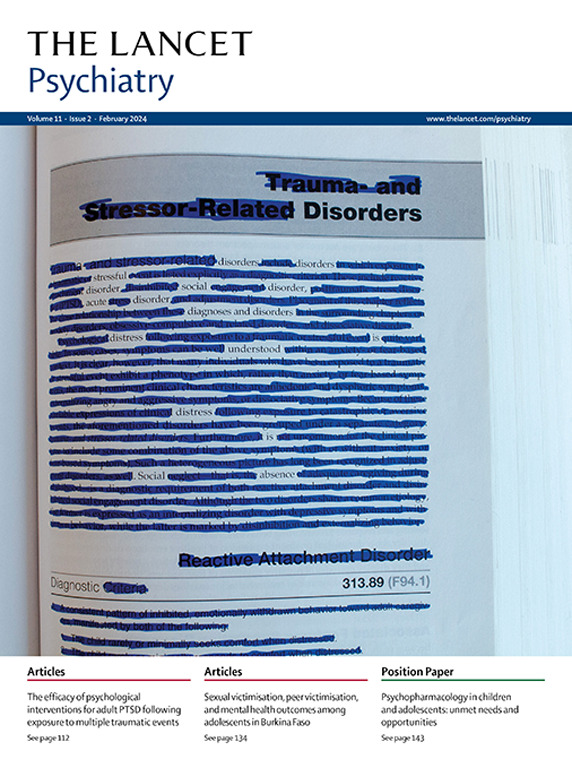Non-fatal suicide behaviours across phases in the COVID-19 pandemic: a population-based study in a Catalan cohort
IF 30.8
1区 医学
Q1 PSYCHIATRY
引用次数: 0
Abstract
The COVID-19 pandemic has been extensively discussed in the context of its effect on mental health. Although global suicide rates have remained stable during the pandemic, the specific effect on non-fatal suicide behaviours during and after the pandemic remains underexplored. This study aims to investigate patterns of non-fatal suicide behaviours before, during, and after the pandemic. In this cohort study, we used data from all hospitals in Catalonia, Spain, collected through the Catalan Suicide Risk Code, which is a specifically designed suicide attempt surveillance protocol, involving a face-to-face, in-depth psychiatric evaluation, after a Catalan resident presents any suicide risk behaviour in any public health-care setting. This evaluation centralises data from suicide registries across the territory. We included non-fatal suicide behaviours, meaning suicidal ideation or attempts that did not result in death, and excluded self-harm behaviours not judged to be linked with suicidal ideation. We considered three periods: the pre-confinement period (Jan 1, 2018, to the enforcement of the lockdown in Spain on March 14, 2020); the confinement period (March 14, 2020, to the end of lockdown on June 21, 2020); and the post-confinement period (June 21, 2020, to Dec 31, 2022). We used Bayesian structural time series models to assess the effect of pandemic phases on non-fatal suicide behaviours, and we ran stratified analyses by sex and age to identify distinct patterns among demographic cohorts. We obtained 26 482 records from Jan 1, 2018, to Dec 31, 2022. The mean age was 37·94 years (SD 18·07), and the sample included 17 584 (66·4%) women and 8898 (33·6%) men. Data on ethnicity were not collected. Temporal trends showed a mild increase in non-fatal suicide behaviours from Jan 1, 2018, to March 13, 2020; a reduction during the confinement period; and a subsequent rise after confinement. Bayesian models suggested a significant causal effect of lockdown easing, resulting in a 50·77% increase in non-fatal suicide behaviours (95% credible interval [CrI] 26·62–76·58; p<0·0001). Stratified analyses indicated that the easing of lockdown resulted in a significant increase in non-fatal suicide behaviours among women (25·92%; 6·71–44·72; p=0·011) and among individuals aged 18 years and younger (72·75%; 38·81–108·11; p<0·0001). This study provides a comprehensive examination of non-fatal suicide behaviours in Catalonia, Spain, emphasising the dynamics of different COVID-19 pandemic phases. The initial reduction during strict lockdown aligns with Joiner's Interpersonal Theory of Suicide, whereas the post-confinement rise reflects complex factors, including social isolation and economic challenges. Sex-specific and age-specific analyses underscore distinct vulnerabilities, emphasising the need for targeted preventive strategies. Centro de Investigación Biomédica en Red de Salud Mental annual budget of G21, Agència de Gestió d’Ajuts Universitaris i de Recerca of the Generalitat de Catalunya. For the Catalan and Spanish translations of the abstract see Supplementary Materials section.COVID-19大流行病各阶段的非致命自杀行为:一项基于人口的加泰罗尼亚队列研究
COVID-19 大流行对心理健康的影响已被广泛讨论。尽管在大流行期间全球自杀率保持稳定,但在大流行期间和之后对非致命自杀行为的具体影响仍未得到充分探讨。本研究旨在调查大流行之前、期间和之后的非致命自杀行为模式。在这项队列研究中,我们使用了西班牙加泰罗尼亚地区所有医院的数据,这些数据是通过《加泰罗尼亚自杀风险代码》收集的,该代码是一项专门设计的自杀未遂监测协议,当加泰罗尼亚居民在任何公共医疗机构出现任何自杀风险行为时,我们都会对其进行面对面的深入精神病学评估。这项评估集中了来自全加泰罗尼亚地区自杀登记处的数据。我们纳入了非致命性自杀行为,即未导致死亡的自杀意念或自杀未遂行为,并排除了与自杀意念无关的自残行为。我们考虑了三个时期:禁闭前时期(2018 年 1 月 1 日至 2020 年 3 月 14 日西班牙实施禁闭);禁闭时期(2020 年 3 月 14 日至 2020 年 6 月 21 日禁闭结束);禁闭后时期(2020 年 6 月 21 日至 2022 年 12 月 31 日)。我们使用贝叶斯结构时间序列模型来评估大流行阶段对非致命性自杀行为的影响,并按性别和年龄进行分层分析,以确定不同人口群组之间的不同模式。我们获得了 2018 年 1 月 1 日至 2022 年 12 月 31 日期间的 26 482 条记录。平均年龄为 37-94 岁(SD 18-07),样本包括 17 584 名女性(66-4%)和 8898 名男性(33-6%)。未收集有关种族的数据。时间趋势显示,从 2018 年 1 月 1 日到 2020 年 3 月 13 日,非致命性自杀行为轻微增加;禁闭期间有所减少;禁闭后又有所上升。贝叶斯模型表明,放松禁闭具有显著的因果效应,导致非致命性自杀行为增加了50%-77%(95%可信区间[CrI] 26-62-76-58;P<0-0001)。分层分析表明,放松封锁导致女性(25-92%;6-71-44-72;p=0-011)和 18 岁及以下人群(72-75%;38-81-108-11;p<0-0001)的非致命自杀行为显著增加。这项研究全面考察了西班牙加泰罗尼亚地区的非致命自杀行为,强调了 COVID-19 不同流行阶段的动态变化。在严格封锁期间,自杀行为最初有所减少,这与乔伊纳的人际自杀理论相吻合,而封锁后自杀行为的增加则反映了复杂的因素,包括社会隔离和经济挑战。针对不同性别和不同年龄的分析强调了不同的脆弱性,强调了有针对性的预防策略的必要性。加泰罗尼亚自治政府 G21 大学研究机构的年度预算。摘要的加泰罗尼亚语和西班牙语译文见 "补充材料 "部分。
本文章由计算机程序翻译,如有差异,请以英文原文为准。
求助全文
约1分钟内获得全文
求助全文
来源期刊

Lancet Psychiatry
PSYCHIATRY-
CiteScore
58.30
自引率
0.90%
发文量
0
期刊介绍:
The Lancet Psychiatry is a globally renowned and trusted resource for groundbreaking research in the field of psychiatry. We specialize in publishing original studies that contribute to transforming and shedding light on important aspects of psychiatric practice. Our comprehensive coverage extends to diverse topics including psychopharmacology, psychotherapy, and psychosocial approaches that address psychiatric disorders throughout the lifespan. We aim to channel innovative treatments and examine the biological research that forms the foundation of such advancements. Our journal also explores novel service delivery methods and promotes fresh perspectives on mental illness, emphasizing the significant contributions of social psychiatry.
 求助内容:
求助内容: 应助结果提醒方式:
应助结果提醒方式:


